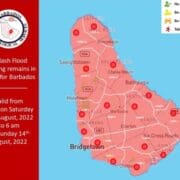Mixed views on Jamaica’s ban on songs pushing illegal activity
Black Immigrant Daily News
A screenshot from Jamarican artiste Skillibeng music video of Whap Whap. –
THERE are mixed views within TT’s music industry when it comes to the recent decision by the Broadcasting Commission of Jamaica (BCJ) to ban audio and video recordings that promote illegal drugs, scamming and illegal guns.
Last week, the commission – that country’s regulatory body for radio, TV and cable – said its directive is “guided by and exercising the powers granted under the Television and Sound Broadcasting regulations.”
It called for an “immediate halt” to any audio or video recording, live song, or speech which promotes and/or glorifies scamming, illegal use or abuse of drugs, illegal or harmful use of guns or other offensive weapons, “jungle justice” or any other form of illegal or criminal activity.
“This includes live editing and original edits (eg edits by producer/label)” as well as similar-sounding words substituted for “offensive lyrics, expletives, or profanities.”
It said the commission is reinforcing its commitment to “keeping the airwaves free of harmful content given the important role traditional media still play as agents of socialisation.
It said using public airwaves to broadcast “songs that promote/glorify illegal activity” could give the wrong impression that criminality is accepted in Jamaican culture and society, inadvertently support “moral disengagement and further normalise criminality” among vulnerable, impressionable youth and young adults.
Its executive director, Cordel Green, said the ban is a result of “a wide-ranging process that included focused monitoring, decoding of subculture dialect and urban slangs (sic), deliberations on balancing free expression vis-a-vis protection from harm, and consultations with industry.”
He said while content regulation must always consider the right to freedom of expression, the ban was necessary.
“Any context in which criminality is presented through music or videos as normal behaviour, conflicts with the tenets of responsible broadcasting.”
Days after, the Media Association of Jamaica accused the BCJ of an “overreach” with the ban.
In a press release, it said it was never approached before the decision was announced.
However, it said its members “unanimously align with the intent of ridding the airwaves of music which is unfit for airplay and believes that all Jamaican stakeholders need to band together and do what is necessary to stem the stimulants of deteriorating social behaviours and a growing crime situation.”
It said it is willing to meet with the BCJ to discuss further.
CEO of the Telecommunications Authority of TT (TATT) Cynthia Reddock-Downes told Newsday she was aware of the ban and that TATT supports it.
However, she said this country’s regulations, unlike Jamaica’s, do not allow for an outright ban on these types of songs.
She said, “We recognise that the current music can impact seriously on young people’s minds, so we are studying what Jamaica has done and determine, based on our current legislation (what can be done).
“What we do right now is, we ask providers, FM stations and so on, to not play the music, and most of them complied.
“But we are currently doing more work in that area to make sure that young minds are not disadvantaged by what they hear on the radio.”
Veteran soca artiste and owner of The Street 91.9FM Neil “Iwer” George told Newsday Jamaica is simply “fixing what they started.
“They started it (that type of music) and they fixing back up their business…
“I think it’s a good step in the right direction. Whether it will reserve the crime situation or not, I can’t say.”
But as much as he sees it as a step forward, he said: “Radio alone don’t dictate what people hear anymore.
“So as much as Jamaica is clearing radio (of that type of music), there’s still social media and those songs not edited (censored).”
He said he “doesn’t really indulge” in playing or promoting that type of music.
Local artiste Trinidad Ghost (real name Akel Mclean) told Newsday that Jamaicans take this type of music “to a next level.”
He is most popularly known for his hit song Zesser which has the hook “More zessing, less stressing.”
He said, “They (Jamaica) does go in depth with their music.
“We Trinidadians will sing about our violence and our crime rate. We sing about what we know about.”
But he added, “I know a lot of artistes singing about violence and guns and they don’t know nothing about that lifestyle. They just singing it because it bringing in a revenue and that’s what the youths gravitating to when it comes to live performances.”
He said the ban will slow down income for artistes and “dent the (music) industry” but it will also “cleanse the place a little.”
He does not believe there should be a full ban but rather “put sanctions on what you could say in the songs.
“In Trinidad we don’t go in depth with scamming (and so on). Our violent music not so raw as Jamaica.
“We Trinibad right now not so bad…as in, so negative or always negative
Local gospel artiste Jaron Nurse – known for his hit song Fed up where he pleads with artistes to stop promoting “d gun thing” – said he was pleased when he learnt about the ban.
“I know TT love to follow and I wish this is one they follow. I can’t wait.”
He said he understands it may be “tough on the artistes” but it will encourage them to be more creative in their lyricism.
He said a few weeks ago, a friend of his who is an artiste who sings about topics included in the ban returned to TT.
“…And a lot of my friends vehicles get shot at and stuff while trying to reach him. And I know its as a result of the music he singing
“The evidence is there. So many Trinibad artistes die as a result of their music because once you’re into the bad, negative music, you have to pick a side or choose a number as they say.”
He said he wished the Jamaican ban also applied to clubs and bars as he’s not sure the raido and TV bans would be enough.
“YouTube is the new radio – they get it there. Instead of waiting until a DJ plays it, they could be their own DJ and play it as many times as they want.”
He said artistes who do this type of music often tell him, “That’s what the youths like and it’s what they know.
“I have a friend he was singing positive music all the time, but as he sing the negative ones, he didn’t even have to go to a radio – they started playing it on the radio and called him for an interview.
“That’s the way the world is designed – negative does always get the attention.”
Veteran producer and founder of Wack 90.1 FM Kenny Phillips said while the intention behind the ban is good, “banning it makes no sense.
“It’s all on social media, so…
“It have all the Trinibad men who have two and three million views on YouTube and thing and those songs never played on the radio.
“These guys going in fetes and the crowds singing the whole song. So online is the issue, social media is the issue. How do you regulate that?”
He said such music promotes crime, abuse of women and “abuse across the board.
“I’ve heard enough to know it’s all about ‘badman ting.’ And if that’s the best that they could do for likes and shares, something wrong.”
Local artiste Rheon Elbourne told Newsday he thinks the ban is “like a cry out from people saying ‘Aye, this thing is a bit too much.’”
But he also said it’s a bit harsh when it comes to artistes’ creativity.
“I understand that corporate society have their level to uphold and they are concerned and making a move to bring a little more balance.”
But he added that the targeted artistes also have positive music which doesn’t get as much airtime as the ones promoting violence.
He said if there was a balance when it comes to radio, bans like these would not be necessary.
But he made it clear he believes this ban should not be brought to TT.
Cornnell “DJ Bonz” Asson of Red 96.7 FM said it’s evident that music influences people.
“…Whether if it’s dancehall or soca or hip-hop or whatever, it could put you in a space like: ‘I want to react like so and so,’ especially the violent music.
“If you teach somebody something, they will eventually learn it, so the more you play gunman music you will eventually learn the badman lifestyle.”
He sees the ban as a “stepping stone” and wishes it could be brought to TT.
“Over the years, that has always been a topic within the entertainment industry.
“I mean, come on, everybody complaining about crime but when it’s time to start taking those steps, are we really serious about taking these steps?”
DJ Aaron 868, DJ at Wack 90.1 said while he understands music with these messages have been around for a long time, “it has gotten more brazen and outright.
“The message isn’t subliminal anymore.
“The younger generation is a lot more susceptible to it because it’s everywhere on social media platforms, they making TikToks, they are guided by what they see online…
“I know the zess or Trinibad genre is what is trending now because a lot of the youths would day that’s how they would reach the masses.”
But he thinks these artistes could improve their lyrics.
“Sing things that would encourage the youths.”
NewsAmericasNow.com







Leave a Reply
Want to join the discussion?Feel free to contribute!